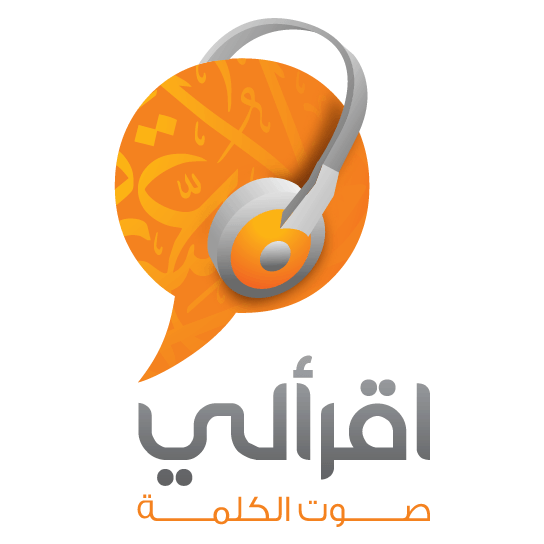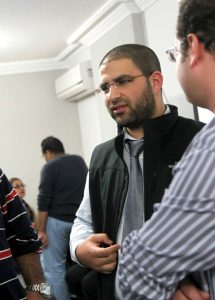

Abdelrahman Wahba is one of three founders behind Iqraaly, a tech company formed at the end of 2010. They believed public radio was vulgar and boring, although they loved listening to audiobooks. Why weren’t there any Arabic audiobooks? Enter Iqraaly, which was betting on the fact that the Arab culture is oral based.
The Qur’an, storytellers, poets and even the kutab, the most successful type of school before modern education, were the main forms of education and culture for generations. They believe this explains why reading isn’t so popular in the Arab countries. Wahba, who is an engineer, argues that reading is not in harmony with our cultural roots and was always devoted to a niche in society.
“Popularizing culture and education is our objective, making it widespread, accessible, and available. Through Iqraaly all of this is possible and more.” Wahba further explains how spending two to three hours a day in the car amounts to about 1100 hours per year – this is equivalent to a year in university. So we could all have our PhDs by now!
Utilizing this wasted time is what Iqraaly is campaigning on – in the same way that KhanAcademy made math and science accessible to the world. Iqraaly democratizes knowledge and through its rich content they aim to overshadow the coarseness of public radio.
Iqraaly will not only enrich your life, it will also lower your stress levels, Wahba argues. There are even a couple of his friends who told him they were so interested in what they were listening to, that they stayed in the car to finish.
“This is the kind of connection and passion our users have with Iqraaly and that makes me all the more excited to spearhead this innovative project of ours,” he said.
When they founded the company, they faced three major challenges. First, the culture of listening to books wasn’t instilled or tested in Egypt. Second, the licensing and copyright ethics of not sharing content with friends and family was not followed. Third, as a startup, to lower costs they would rely on volunteers for creating the audio.
To overcome these difficulties, they decided to offer free small audio units to encourage people to exchange with each other. It was a way to test the market and create a user base. Instead of starting with books, they also started with something that is already very popular: political opinion articles. Lastly, they started with a mobile website and launched in July of 2011. The dream of Iqraaly began.
Wahba points out that like anything in life, it was a learning curve. They quickly discovered several problems: The website was not user friendly, the volunteers were not reliable and professional, and if the content wasn’t fresh, people didn’t bother with the downloads. Another huge impediment was that they were not very visible, so they decided they needed a marketing campaign, which of course needed money.
The conclusion was to develop mobile applications in order to overcome the two main obstacles of fresh content and user friendliness. So they started to look for angel investors. For those who don’t know, angel investors are businessmen who believe in your idea and are able to take a leap of faith. It’s a high-risk venture that can lead to high return if the business takes off.
For a whole year, Iqraaly’s founders searched for funding and finally an Egyptian angel investor decided in June 2012 that they were worthwhile. It is at this point that Wahba left his job and devoted himself entirely to Iqraaly. They released the first version of the app in Jan. 2013.
“The learning doesn’t stop and everyday I realize what a dynamic time we live in,” he says. “It’s is a fluid environment that changes because it’s based on people’s interest and it’s so interesting to witness and react to these changes. For example, ever since March 2013 there is less interest in political news and the political opinion articles. So we increased the variety of content by adding parenting, cooking, traffic, cars, sports, self help. This is also the time when we secured our second round of investments.”
“We were surprised to find out that there is a huge demand on audiobooks and many clients have been demanding this service, which was our initial idea,” Wahba said, explaining how the problems lie with book publishers who are more aggressive and still believe they can prevent the digitization that has already happened to the music industry.
Also, books require different economies of scale because books are larger, so the audio clip would have to be large. For their soft launch in Ramadan, Iqraaly released books divided into chapters that came out biweekly. This was ideal for Ramadan because they were religious books and could be divided for that month. One of them was by Dr. Mostafa Mahmoud, which ended up being one of the most popular downloads.
They hope to move forward with book publishers and get more material and overcome all these obstacles in the near future.
The Iqraaly team are thrilled with the positive response of customers. They have had 80,000 downloads of the application. Iqraaly is available on iPhone, iPad, Android, Blackberry, Windows 8 mobile and Windows 8 tablet. Their first target is to reach half a million downloads.
They also hope to strike a deal with Vodafone and make it also available for regular mobile phones. Wahba elaborates how this would make Iqraaly so much more far reaching. It could then be used to even help irradiate illiteracy. “We hope not just to find Iqraaly on every phone in Egypt, but to have it across the Arab World too.”
And if someone wants to add their blog or program to Iqraaly – if you have something to say and you want to be heard, then contact Abdelrahman Wahba. He will take you through the process of integrating between Iqraaly and your online presence to enhance your audience reach.
Iqraaly’s uniqueness lies in its Arabic-only content. The most popular downloads are posts by the recruitment website Wazaaf that give hints and tips on getting a job. On the political front, Belal Fadl is still quite popular, as well as the newspaper headlines, which replicate newspaper kiosks by featuring headlines from a variety of publications twice a day, morning and evening.
The tech review and entrepreneurship categories have consistent users, while the reviews from Diwan are about books they have in the store. Alef Bookstores has a program called “The Cultural Airplane,” along with other content, and Bey2ollak provides a traffic update twice in the morning (8am and 9am) and three times in the afternoon (3pm, 4pm and 5pm).
Wahba says he is not worried about the content, because it gets filtered like fruit: The good is listened to and the bad is thrown out. And the variety is tremendous, changing and increasing every day.
Wahba concludes: “Iqraaly is my dream and I will persevere behind it until it succeeds, there is no going back now.”
WE SAID THIS: Check out Iqraaly’s Facebook page at https://www.facebook.com/iqraaly


